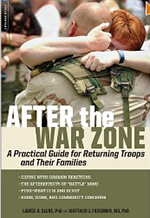During the weekend leading up to Veterans Day, Professional Development Resources is featuring ten of its continuing education courses that train professionals to treat mental health problems that are seen in many members of the military and their families. The following courses are 20% off through Monday, November 12, 2012:
- PTSD – What is It?
- Combat-Induced PTSD
- PTSD Treatment I: CBT, Neurobiology & Pharmacotherapy
- PTSD Treatment II: Group and Family Therapy
- Brain Injury Treatment: A Neuropsychological Approach
- PTSD Vicarious Traumatization: Towards Recognition & Resilience-Building
- PTSD & Substance Abuse: Dual Diagnosis Overview & Treatment
- A Dissociative Identity Disorder Casebook
- Counseling Military Families: What Mental Health Professionals Need to Know
- After the War Zone
 One of the most serious conditions among those exposed to combat is Post-Traumatic Stress Disorder (PTSD).
One of the most serious conditions among those exposed to combat is Post-Traumatic Stress Disorder (PTSD).
According to the National Institute for Mental Health, PTSD is an anxiety disorder that can develop after exposure to a terrifying event or ordeal, in which grave physical harm occurred or was threatened. Traumatic events that may trigger PTSD include violent personal assaults, natural or human-caused disasters, accidents, or military combat.
People with PTSD have persistent frightening thoughts and memories of their ordeal and feel emotionally numb, especially with people they were once close to. They may experience sleep problems, feel detached or numb, or be easily startled.
The U.S. Department of Veterans Affairs summarizes the probabilities of certain groups having PTSD at some point in their lives:
- About 7-8% of the general population
- About 11-20% of Veterans of the Iraq and Afghanistan wars (Operations Iraqi and Enduring Freedom)
- About 10% of Gulf War (Desert Storm) Veterans
- About 30% of Vietnam Veterans
–
“The numbers are staggering,” says Leo Christie, PhD, CEO of Professional Development Resources. “A recent White House Executive Order dated August 12, 2012 states: “Since September 11, 2001, more than two million service members have deployed to Iraq or Afghanistan. Long deployments and intense combat conditions require optimal support for the emotional and mental health needs of our service members and their families. The need for mental health services will only increase in the coming years as the Nation deals with the effects of more than a decade of conflict.”
The stresses that are part of active deployment – particularly in combat areas – do not cease when service members finish their tour of duty and return to civilian life. The statistics noted above are remarkable when one considers that it is not only the individual service member who is affected by the symptoms, but also his or her family members. This means that specialty mental health services may be required for marital issues as well as child behavior problems and other family stressors.
Christie adds “with increasing numbers of returning service personnel and their families presenting in acute distress, it is unlikely that any mental health professional will NOT encounter them in his or her clinical office. Our goal is to offer them the specialized information they need in order to deliver effective treatment.”
“We are very pleased to have these courses and to offer them for accredited continuing education units,” says Christie. “I hope this special offer will make them available to every professional who works with veterans and their families.”








